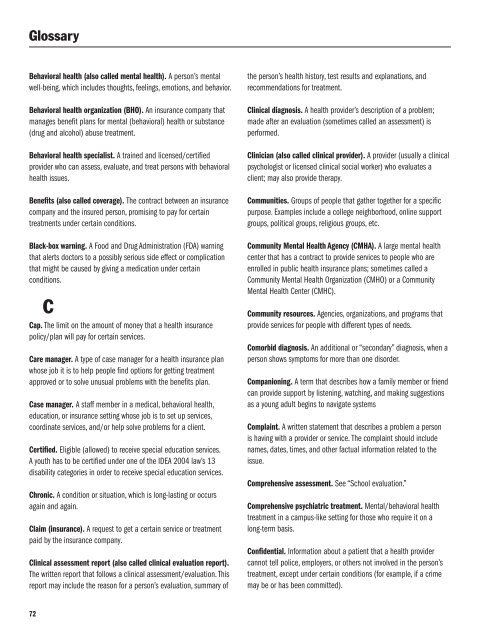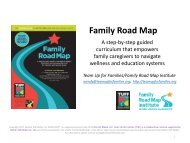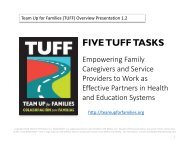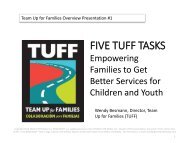Look Inside Young Adult Road Map
You also want an ePaper? Increase the reach of your titles
YUMPU automatically turns print PDFs into web optimized ePapers that Google loves.
Glossary<br />
Behavioral health (also called mental health). A person’s mental<br />
well-being, which includes thoughts, feelings, emotions, and behavior.<br />
Behavioral health organization (BHO). An insurance company that<br />
manages benefit plans for mental (behavioral) health or substance<br />
(drug and alcohol) abuse treatment.<br />
Behavioral health specialist. A trained and licensed/certified<br />
provider who can assess, evaluate, and treat persons with behavioral<br />
health issues.<br />
Benefits (also called coverage). The contract between an insurance<br />
company and the insured person, promising to pay for certain<br />
treatments under certain conditions.<br />
Black-box warning. A Food and Drug Administration (FDA) warning<br />
that alerts doctors to a possibly serious side effect or complication<br />
that might be caused by giving a medication under certain<br />
conditions.<br />
C<br />
Cap. The limit on the amount of money that a health insurance<br />
policy/plan will pay for certain services.<br />
Care manager. A type of case manager for a health insurance plan<br />
whose job it is to help people find options for getting treatment<br />
approved or to solve unusual problems with the benefits plan.<br />
Case manager. A staff member in a medical, behavioral health,<br />
education, or insurance setting whose job is to set up services,<br />
coordinate services, and/or help solve problems for a client.<br />
Certified. Eligible (allowed) to receive special education services.<br />
A youth has to be certified under one of the IDEA 2004 law’s 13<br />
disability categories in order to receive special education services.<br />
Chronic. A condition or situation, which is long-lasting or occurs<br />
again and again.<br />
Claim (insurance). A request to get a certain service or treatment<br />
paid by the insurance company.<br />
Clinical assessment report (also called clinical evaluation report).<br />
The written report that follows a clinical assessment/evaluation. This<br />
report may include the reason for a person’s evaluation, summary of<br />
the person’s health history, test results and explanations, and<br />
recommendations for treatment.<br />
Clinical diagnosis. A health provider’s description of a problem;<br />
made after an evaluation (sometimes called an assessment) is<br />
performed.<br />
Clinician (also called clinical provider). A provider (usually a clinical<br />
psychologist or licensed clinical social worker) who evaluates a<br />
client; may also provide therapy.<br />
Communities. Groups of people that gather together for a specific<br />
purpose. Examples include a college neighborhood, online support<br />
groups, political groups, religious groups, etc.<br />
Community Mental Health Agency (CMHA). A large mental health<br />
center that has a contract to provide services to people who are<br />
enrolled in public health insurance plans; sometimes called a<br />
Community Mental Health Organization (CMHO) or a Community<br />
Mental Health Center (CMHC).<br />
Community resources. Agencies, organizations, and programs that<br />
provide services for people with different types of needs.<br />
Comorbid diagnosis. An additional or “secondary” diagnosis, when a<br />
person shows symptoms for more than one disorder.<br />
Companioning. A term that describes how a family member or friend<br />
can provide support by listening, watching, and making suggestions<br />
as a young adult begins to navigate systems<br />
Complaint. A written statement that describes a problem a person<br />
is having with a provider or service. The complaint should include<br />
names, dates, times, and other factual information related to the<br />
issue.<br />
Comprehensive assessment. See “School evaluation.”<br />
Comprehensive psychiatric treatment. Mental/behavioral health<br />
treatment in a campus-like setting for those who require it on a<br />
long-term basis.<br />
Confidential. Information about a patient that a health provider<br />
cannot tell police, employers, or others not involved in the person’s<br />
treatment, except under certain conditions (for example, if a crime<br />
may be or has been committed).<br />
72














